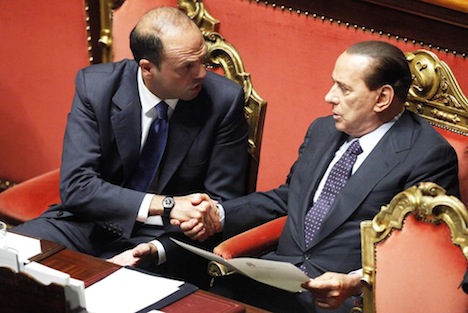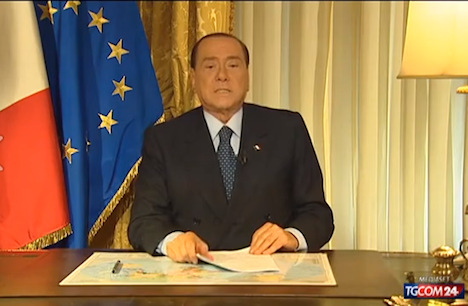In a stunning weekend move, deputy prime minister Angelino Alfano, the longtime political heir of former prime minister Silvio Berlusconi, refused to join Berlusconi’s newly rechristened Forza Italia political group. Instead, Alfano will form his own center-right faction, the Nuovo Centrodestra (or the ‘New Center-Right’). Alfano, who also serves as the interior minister in the ‘grand coalition’ government headed by center-left prime minister Enrico Letta, disagreed with Berlusconi’s attempt in late September to bring down Letta’s government in order to make way for early elections — ultimately, even Berlusconi backed down when it came time to hold a vote of no confidence.
The timing of the split comes at a critical point for Berlusconi (pictured above, right, with Alfano) and the Italian center-right. Berlusconi faces expulsion from the Senato (Senate), Italy’s upper parliamentary chamber, in a vote scheduled to take place on November 27 — a direct result of a final conviction against Berlusconi for tax evasion in relation to his corporate media empire. He’s set to serve a one-year sentence sometime this autumn and, due to his age, Berlusconi has elected community service over prison.
Berlusconi is preparing to take his reduced Forza Italia core — essentially the renamed version of his longtime Il Popolo della Libertà (PdL, People of Freedom), which itself was known as Forza Italia between 1994 and 2007 — into opposition.
Most immediately, the new Alfano center-right faction’s emergence insulates the government from Berlusconi’s whims by delivering enough center-right senators and deputies to keep the government in place. In that regard, Alfano’s move this weekend has done more to stabilize Italian politics for the foreseeable future than anything in the past seven months of the Letta government. While Alfano still opposes Berlusconi’s expulsion from the Senate next week, Berlusconi seems unlikely to win against the combined force of the Italian left and the protest Movimento 5 Stelle (M5S, the Five Star Movement).
The move could paint Alfano as a public servant willing to place governance and stability over scoring political points, and voters could reward Alfano when elections are held (still likely next year). The move also makes it very likely that Alfano will lead the center-right into the next election, just as popular Florence mayor Matteo Renzi seems likely to win a landslide victory for the leadership of the Letta’s center-left Partito Democratico (PD, Democratic Party) in a vote that will be held on December 8.
Regardless of whether Letta, age 47, or Renzi, age 38, ultimately becomes the center-left prime ministerial candidate in the next election, a new generation of leadership is emerging in Italian politics — especially as the 43-year-old Alfano supplants the 77-year-old Berlusconi and other statesmen like Monti, age 70, and former Democratic Party leader Pier Luigi Bersani, age 62, fade from the center of Italian politics.
But it’s been a maxim of Italian politics for the past two decades that you count out Berlusconi at your own risk. Continue reading What the Alfano-Berlusconi split means for Italian politics

